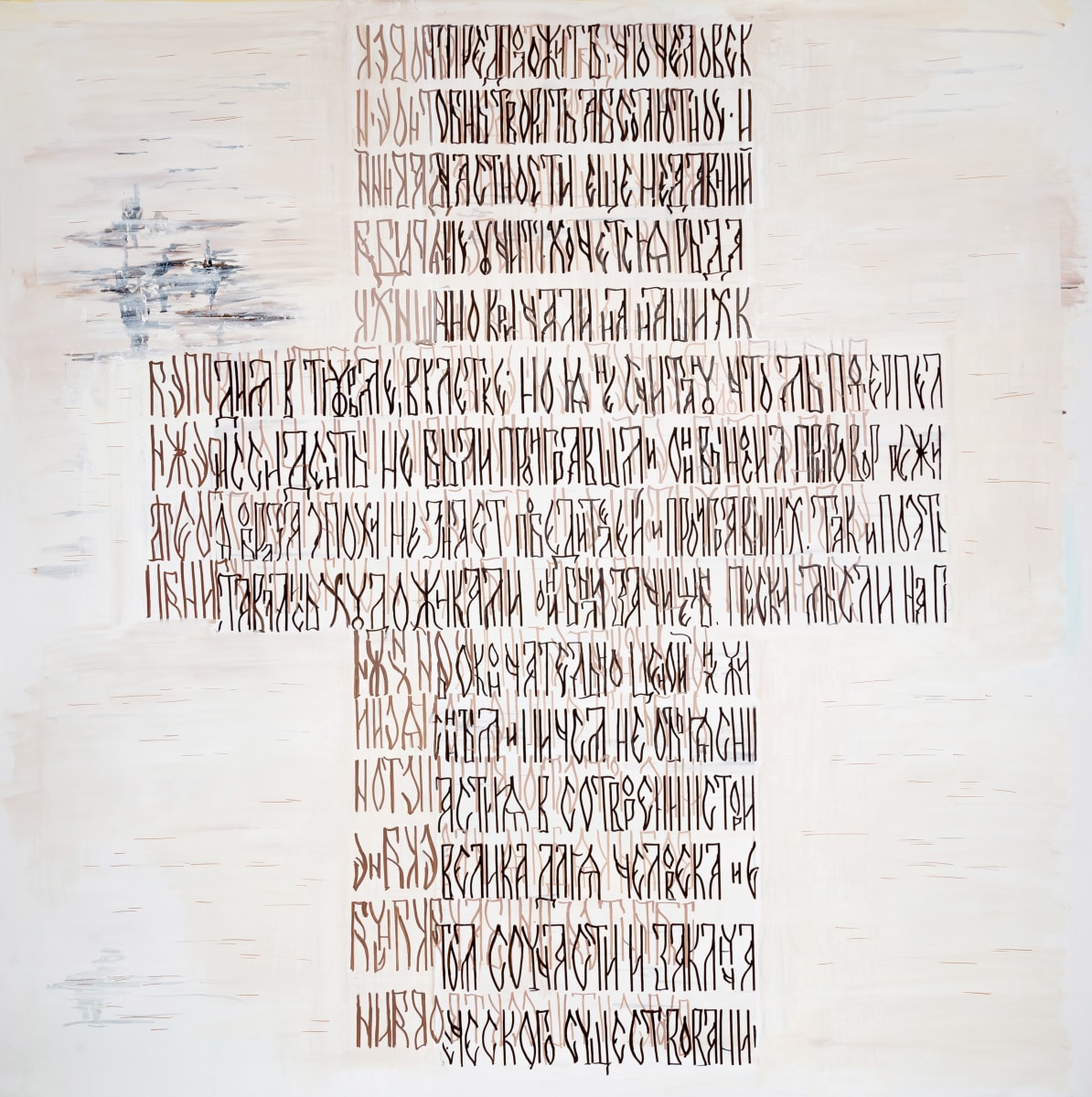N.T.: Key elements of this work, besides the text, is birch bark and Christian cross. When I was a baby in Siberia of the 90s, we would drink birch juice with my grandmother, and it was sweet and fresh, like a promise of a beautiful new Russia with no more tyrants, imperialism and unnecessary death. When I was 10, my dad told me that the biggest thing that an artist could do is to start a new religion. It was my goal as an artist ever since, hence the cross. Can we believe in something greater than ourselves without being sexist, homophobic, transphobic, tyrant-supporting fanatics?
1937 is a dark year for the USSR, it’s a year of The Stalin’s Great Terror. Today, putin refers to Stalin as “an effective manager”, covering up all his crimes. Today, kids in Russian schools learn that Stalin was good. Can we grow as humanity if history teaches us nothing?
Text in Russian (quoted from Tolokonnikova’s closing statement in court before getting sentenced to 2 years, August 2012) :
Кто бы мог предположить, что человек и контролируемая им государственная система, вновь и вновь способны творить абсолютное, немотивированное зло. Кто бы мог предположить, что история - в частности, еще недавний опыт страшного Большого сталинского террора - совершенно не учит. Хочется рыдать, глядя на то, как приемы средневековой инквизиции воцаряются в правоохранительной и судебной системах Российской Федерации, которая – наша страна. Но с момента ареста мы не можем больше рыдать, мы разучились плакать. Мы отчаянно кричали на наших панк-концертах, как могли и как умели, о беззакониях начальства и властей. Но вот у нас украли голос.
Мы сидим в тюрьме, в клетке. Но я не считаю, что мы потерпели поражение. Как и диссиденты не были проигравшими. Теряясь в психбольницах и тюрьмах, они выносили приговоры режиму. Искусство создания образа эпохи не знает победителей и проигравших. Так и поэты, обэриуты, до конца оставались художниками. Они были «зачищены» в 1937 году. Введенский писал: «Нам непонятное приятно, необъяснимое нам друг». Поиски мысли на грани смысла воплотились окончательно ценой их жизни, унесенной бессмысленным и ничем не объяснимым Большим Террором. Ценой собственных жизней обэриуты невольно доказали, что их учение о бессмыслице и алогичности, как нервах эпохи, было верным. Возведя при этом художественное на уровень исторического.
Цена соучастия в сотворении истории всегда непомерно велика для человека и для его жизни. Но именно в этом соучастии и заключается вся соль человеческого существования.
English translation (by Masha Gessen's "Word Can Break Cement"):
Who would have thought that a person and the state system he controls would be repeatedly capable of entirely wanton evil? Who would have thought that history and Stalin’s Great Terror, in particular, not so very long ago, would not be taught at all? It makes you want to weep to see how the methods of the medieval inquisition are brought out by the law-enforcement and judicial system of the Russian Federation, which is our country. Since the time of our arrest, however, we can no longer weep. We’ve forgotten how to cry. At our punk concerts we used to shout as best we could about the iniquities of the authorities and now we’ve been robbed of our voice.
Kat, Maria, and I are in jail. We are in a cage. But I don’t think that we have been defeated. Just as the dissidents were not defeated. They were lost in psychiatric wards and the jails, but it was they who pronounced the regime’s verdict. The art of creating the image of an era knows not winners and losers. The same way as the OBERIU* poets remained artists, truly inexplicable and incomprehensible, even after being purged in 1937. [The poet] Alexander Vvedensky wrote, “The inexplicable pleases us, and the incomprehensible is our friend.”
The OBERIUs’ elevated and refined pursuits, their search for thought at the edge of meaning, ultimately cost them their lives, taken by the senseless and truly inexplicable Great Terror. They paid with their lives to show that they had been right to believe that senselessness and lack of logic expressed their era best. They made art into history.
The price of taking part in making history is always disproportionately large for the individual and his life. But it is also the meaning of human existence.
- Collections: AVAILABLE WORKS, ICONS, Linz



